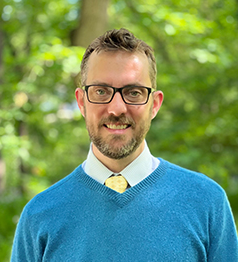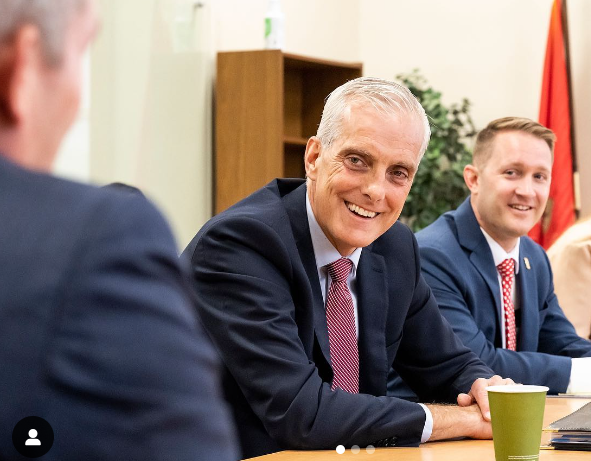WCER Researcher Ross Benbow in Campus Roundtable with U.S. Secretary of Veterans Affairs
Benbow's $2M NSF Project Exploring Social Support for Student Military Highlighted
June 15, 2023 | By WCER Communications

VETWAYS Principal Investigator Benbow
WCER researcher Ross Benbow and his growing NSF project involving support networks for student military were part of a recent roundtable discussion on campus with U.S. Secretary of Veterans Affairs Denis McDonough.
The June 6 discussion featured 11 student veterans and staff members, with a focus on how best to support UW–Madison’s more than 2,000 student military members and veterans (SSM/Vs). Benbow attended to brief McDonough about his ongoing Veteran Education to Workforce Affinity and Success Study, known as VETWAYS, which has shown the importance of social support and relationships in veterans’ success on Wisconsin campuses.
“Feelings of camaraderie, common purpose, and collaboration with fellow students and college educators” are important to many veteran and service members’ college pathways, Benbow says. “Our work and the work of other researchers further suggests that SSM/V transitions into and through university can be improved by helping students build campus relationships and by showing university-based support for their unique experiences.”
Benbow was introduced to McDonough by UW–Madison’s Director of University Veteran Services, Joe Rasmussen, who has been a member of the VETWAYS’ advisory board since the project began in 2019.
“I told Secretary McDonough that a big part of our work is providing our data to local educators so they can advocate for their students,” Benbow says, explaining that his research underlined the importance of directing more resources towards veterans’ services on University of Wisconsin System campuses. He says resources are particularly needed to:
- create more community-building opportunities for these students on campus
- create more dedicated spaces for these students, especially at UW–Madison
- hire more student affairs-oriented veteran service educators who could use their time to organize community-building events and information services on campus
UW–Madison’s Veteran Services Office currently provides financial and GI Bill services to more than 850 eligible students each semester.
Benbow’s project is funded by two grants from the National Science Foundation, totaling nearly $2 million since 2019. In the study’s first iteration, VETWAYS researchers used surveys and interviews to investigate the social support networks and academic/career success of military-connected students at UW–Madison, UW–Milwaukee, UW-Oshkosh, UW–Green Bay, and UW–Stout, particularly students in science, technology, engineering, and mathematics (STEM) fields.

At center, U.S. Secretary of Veterans Affairs Denis McDonough listens to speakers during a campus roundtable discussion on student veteran issues June 6. Photo: Althea Dotzour
While follow-up checks on those original subjects continue, the study team has received further funding to expand the project to follow additional military and non-military students for comparative purposes at several universities nationwide, using a model similar to the researchers’ Wisconsin-based work. That focus was a timely one, as McDonough on June 6 asked Benbow if they’d found any benefits for non-military students in having student service members or veterans in class.
Benbow told him previous research and the team’s own work suggests there are benefits.
“Non-military students gain from military-connected students’ skills and experiences, particularly their maturity, leadership, communication, perseverance, and teamwork skills in the classroom and on campus,” Benbow says.
Findings to date from six new data reports by Benbow and VETWAYS Project Assistant Xin Xie are centered on the five original UW campuses and focus on participant demographics; pathways since the study started; deployments/activations; COVID-19 impacts; work volition; SSM/V cultural assets; social support networks; and relationships between these factors across time.
University officials say McDonough’s visit to UW–Madison provided an opportunity to bolster partnerships with the U.S. Department of Veterans Affairs to better serve student military. It also included a meeting with Chancellor Jennifer Mnookin and a recognition of students’ service. Other groups in the roundtable discussion included Odyssey Beyond Wars, which offers a fully funded academic program for veterans, and the UW Missing in Action Recovery Identification Project.


